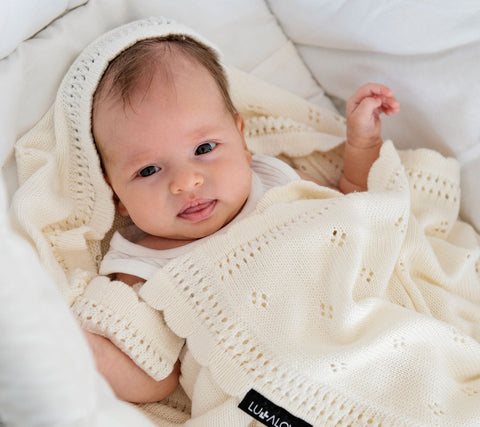When it comes to selecting the perfect baby blanket, the choice of material plays a pivotal role in ensuring your baby's comfort, safety, and well-being. Natural materials such as bamboo, merino wool, and cotton are highly recommended over synthetic alternatives. Let's explore why these natural fibres are superior for baby blankets and why synthetic materials are best avoided.

The Benefits of Natural Materials
Bamboo: Bamboo fabric is incredibly soft, making it gentle on your baby's delicate skin. It's known for its breathability and ability to wick moisture away, keeping your baby comfortable and dry. Bamboo also possesses natural antibacterial properties, reducing the likelihood of bacteria growth and odours. Additionally, it offers natural UV protection, making bamboo blankets a great choice for protecting your baby from harmful sun rays.
Shop Our 100% Bamboo Baby Blankets
Merino Wool: Merino wool is renowned for its temperature-regulating properties. It can keep your baby warm in the cold months and cool in the heat, thanks to its natural breathability and moisture-wicking abilities. Merino wool is also hypoallergenic, making it suitable for babies with sensitive skin. Its durability means a merino wool blanket can last through the years, becoming a cherished item well into childhood.
Shop Our Merino Wool Baby Blankets
Cotton: Cotton is a breathable, soft fabric that's gentle on the skin, making it ideal for baby blankets. It's highly absorbent, ensuring any dampness is quickly removed, keeping your baby dry and comfortable. Cotton is also easy to clean and maintain, standing up well to regular washing without losing its softness or comfort.
Shop All Season Bamboo-Cotton Baby Blankets
Why Avoid Synthetic Materials
Synthetic materials, such as polyester or acrylic, are often less breathable than their natural counterparts. This can lead to overheating or excessive sweating in babies, who are less able to regulate their body temperature. Synthetic fabrics also tend to trap moisture rather than wick it away, creating a damp environment that could irritate a baby's skin.
Furthermore, synthetic materials can harbour more dust and allergens, posing a risk to babies with allergies or sensitive skin. They're also more likely to contain harmful chemicals and irritants, as synthetics are often treated with various chemical processes during manufacturing.

Natural vs Synthetic: The Comparison
While synthetic blankets may offer the appeal of being stain-resistant and seemingly durable, they fall short in providing the essential qualities required for a baby's health and comfort. Natural materials offer superior softness, breathability, and safety for sensitive skin without the need for chemical treatments. They're also better for the environment, as natural fibres are renewable and biodegradable, unlike synthetic fibres, which contribute to plastic pollution.
In conclusion, choosing a baby blanket made from natural materials like bamboo, merino wool, or cotton ensures you're providing the best for your baby. These materials offer unparalleled comfort, safety, and health benefits that synthetic alternatives simply cannot match. As parents, making an informed choice about your baby's blanket material can contribute significantly to their comfort and overall well-being.

